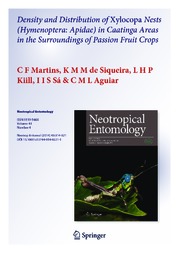Density and distribution of Xylocopa nests (Hymenoptera: Apidae) in Caatinga areas in the surroundings of Passion fruit crops.
Density and distribution of Xylocopa nests (Hymenoptera: Apidae) in Caatinga areas in the surroundings of Passion fruit crops.
Autoria: MARTINS, C. F.; SIQUEIRA, K. M. M. de; KIILL, L. H. P.; SÁ, I. I. S.; AGUIAR, C. M. L.
Resumo: Due to their importance as pollinators of many plant species, this study aimed to know the nest density, spatial distribution, and nesting substrates used by Xylocopa species in the Caatinga, a xerophilous vegetation f Northeastern Brazil. Three areas of Caatinga in the surroundings of passion fruit crops were sampled. The bee species found in these areas were Xylocopa grisescens Lepeletier and Xylocopa frontalis (Olivier). All nests were in Commiphora leptophloeos (Burseraceae) trees (n=113). Phytosociological analysis showed that this tree species presented the highest absolute density (212.5 individuals/ha) and index of importance value (52.7). The distribution pattern of the C. leptophloeos was aggregated. The nests were located in dead and dried branches with an average diameter of 5.3±2.0 cm (n=43). The mean number of nests/tree was 3.1± 2.8 (n=113). The less disturbed area showed 6.7 nests/ha and 4.2 nests/tree. In the disturbed areas, 0.9 nests/ha and 2.4 to 2.7 nests/tree were observed. The availability of substrate for nesting in the studied areas and its importance as a limiting factor for nesting are discussed
Ano de publicação: 2014
Tipo de publicação: Artigo de periódico
Unidade: Embrapa Semiárido
Palavras-chave: Abelha, Bee, Caatinga, Densidade ninho, Inseto, Maracujá, Ninho agregação, Passion fruit, Polinização, Pollinators, Vegetação xerófila, Xylocopa
Observações
1 - Por padrão são exibidas publicações dos últimos 20 anos. Para encontrar publicações mais antigas, configure o filtro ano de publicação, colocando o ano a partir do qual você deseja encontrar publicações. O filtro está na coluna da esquerda na busca acima.
2 - Para ler algumas publicações da Embrapa (apenas as que estão em formato ePub), é necessário ter, no celular ou computador, um desses softwares gratuitos. Sistemas Android: Google Play Livros; IOS: iBooks; Windows e Linux: software Calibre.
Acesse outras publicações
Acesse a Base de Dados da Pesquisa Agropecuária (BDPA) para consultar o acervo completo das bibliotecas da Embrapa.

